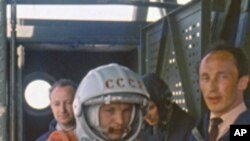Fifty years ago this month, the Soviet cosmonaut Yuri Gagarin became the first human in space, making a single, 108 minute orbit of the Earth. One month later, on May 5, U.S. astronaut Alan Shepard completed his own venture into space: a fifteen minute suborbital flight.
To commemorate the 50th anniversary of this momentous endeavor, the United Nations declared April 12th International Day of Human Space Flight. The Resolution was unanimously passed by the General Assembly on April 8th.
Human space flight was a tremendous break-through, a critical stage in the history of technological progress. It ushered in a new era in space exploration and scientific discovery.
But in the beginning, human space flight was a competition for primacy between the United States and the Soviet Union, a high-stakes struggle for security and prestige.
"Today the Space Race is over, and thanks to the remarkably improved atmosphere of cooperation, we have all won," said U.S. Deputy Permanent Representative to the United Nations Rosemary DiCarlo.
"Space exploration is no longer a competition. It is a vital aspect of modern science and an endeavor requiring close cooperation between international partners in pursuit of our scientific and technological goals. The United States and Russia’s work together on space science and exploration has long been, and continues to be, a model of productive partnership between nations," said Ambassador DiCarlo.
"The accomplishments of space exploration stretch beyond learning about our planet and universe, and have provided the technological basis for innovations in computer technology, medicine, renewable energy, and countless other fields. What is more, human spaceflight has turned into one of the world’s truly international undertakings, with citizens from over thirty different countries — from Afghanistan to Vietnam — traveling beyond Earth’s atmosphere."
Speaking about the U.S. Space Program in 1962, then-President John F. Kennedy said:
"We set sail on this new sea because there is new knowledge to be gained, and new rights to be won, and they must be won and used for the progress of all people."
"Those words ring just as true today," said Ambassador DiCarlo. "For all these reasons, the United States is honored to have co-sponsored the resolution we have just adopted and join in the commemoration of this historic milestone".
Human space flight was a tremendous break-through, a critical stage in the history of technological progress.




